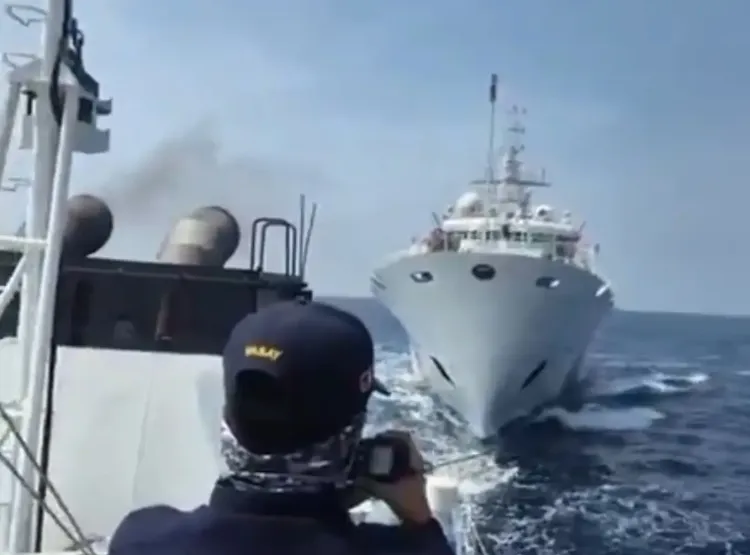Why is the Philippines Condemning China's Recent Actions Around Sandy Cay?

Synopsis
Key Takeaways
- The Philippines firmly asserts sovereignty over Sandy Cay.
- China's recent actions are viewed as provocations.
- International law is central to the dispute.
- Regional stability is at risk due to escalating tensions.
- Coordinated efforts by Philippine authorities reinforce maritime rights.
Manila, April 28 (NationPress) The Philippines has vocally rebuked the latest actions by China around Sandy Cay, reiterating that this area unequivocally falls under its sovereignty and that no provocations from China can alter this fact.
Reports indicate that Chinese personnel have hoisted a Chinese flag and engaged in inspection activities on Sandy Cay, a sandbar situated close to Pag-asa Island, which lies within the Philippines' Exclusive Economic Zone (EEZ).
Philippine House Speaker Romualdez has characterized these Chinese maneuvers as 'desperate and cheap stunts' aimed at misleading the public and reinforcing illegitimate claims, according to the state-run Philippine News Agency (PNA).
“I vehemently denounce the recent actions of the China Coast Guard (CCG) in and around Sandy Cay, an area firmly within the Philippines' EEZ and undeniably part of Philippine sovereignty,” Romualdez stated.
“I urge China to halt these reckless provocations, respect international law, and cease these cheap stunts,” he added.
Referencing the 2016 ruling by the Permanent Court of Arbitration in The Hague, which nullified China's extensive claims in the South China Sea, including Sandy Cay, he asserted that the sandbar, located a mere four nautical miles from Pag-asa Island, is Philippine territory.
“We have consistently and effectively exercised jurisdiction over it,” he emphasized.
Romualdez also commended the prompt measures taken by Philippine authorities to assert the nation's presence in the region, urging a cessation of China's aggressive tactics.
In response to Chinese claims over the weekend alleging the seizure of a Pag-asa Island cay, a Philippine National Security Council (NSC) official on Monday called for China and its maritime forces to refrain from actions that could escalate tensions in the West Philippine Sea (WPS).
Additionally, NSC Assistant Director General Jonathan Malaya dismissed the CCG's assertion that the Pag-asa cays had been seized.
“The realities on the ground do not corroborate the statements issued by the CCG; therefore, we implore China and the CCG to act with restraint and avoid further escalating tensions in the WPS,” he stated during a media briefing.
Moreover, the National Task Force-West Philippine Sea confirmed that the Philippines asserted its sovereignty over Pag-asa Cays 1, 2, and 3, as well as the surrounding waters, through a coordinated inter-agency maritime operation on Sunday morning.
“This collective effort involved the Philippine Navy, Philippine Coast Guard, and Philippine National Police-Maritime Group, reinforcing the lawful and routine exercise of maritime domain awareness and jurisdiction over the West Philippine Sea,” the agency noted.
China's increasing assertiveness in the South China Sea continues to be a significant concern for multiple Southeast Asian nations, including the Philippines, as China lays claim to vast areas of the sea, which are rich in untapped natural resources like oil and gas.
The relationship between the Philippines and China has notably deteriorated due to Beijing's growing assertiveness in the South China Sea.









